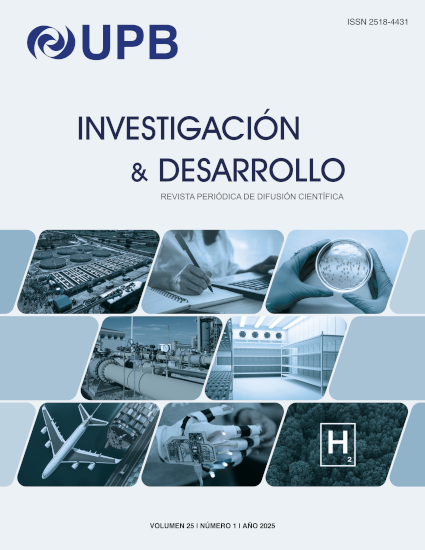INFLUENCE OF TEACHERS’ DIGITAL COMPETENCE ON THE ACHIEVEMENT OF ICT COMPETENCE IN SECONDARY EDUCATION STUDENTS
DOI:
https://doi.org/10.23881/idupbo.025.1-2iKeywords:
Digital Teaching Competence, Virtual Environment, Information and Communication Technologies, ICT CompetencyAbstract
The objective of this research is to analyze the relationship between the digital competencies of secondary education teachers and the level of achievement of digital competence among students in Basic Regular Education institutions in the Tacna region, Peru, within the post-pandemic context. A mixed-methods approach was adopted, combining quantitative and qualitative methodologies. For the quantitative phase, 669 teachers were surveyed, while the qualitative phase involved interviews with 100 teachers to gain deeper insight into their experiences during the transition from remote to in-person education between 2021 and 2023. The findings reveal that most teachers possess an intermediate level of digital competence, classified between the integrator and expert levels. However, significant limitations were identified regarding the systematic integration of digital tools in the classroom. These limitations are attributed to inequalities in access to technology, connectivity deficiencies, and the lack of national policies aimed at teaching professional development. Although some improvements in infrastructure and equipment have been noted since the pandemic, major barriers persist in achieving widespread use of ICT. The qualitative interviews reinforce the need for ongoing training and stronger institutional support. The study concludes that there is a significant relationship between teachers’ digital competence levels and students’ ability to function in virtual environments. This highlights the critical importance of enhancing teacher training and improving technological conditions to foster students’ digital competence.Downloads
References
[1] Marin-Díaz, V.; Begoña, E. y Vega, E., «La realidad virtual y aumentada en el aula de secundaria,» Campus Virtuales, vol. 11, nº 1, pp. 225-236, 2022.
[2] MINEDU, PeruEduca: Programa nacional para el desarrollo de la Competencia Digital, Lima-Perú: Perú Educa, 2021.
[3] Cabero-Almenara J. y Llorente-Cejudo,C., «Covid-19: transformación radical de la digitalización en las instituciones universitarias,» Campus Virtuales, vol. 9, nº 2, pp. 25-34, 2020.
[4] Maksimovic, J., Stosic, L. Tomczyk, L y Stamenkovic, M., «Digital competencies of Teachers in the context of professional development,» XVI Latin American Conference on Learning Technologies (LACLO), nº https://doi.org/10.1109/LACLO54177.2021.00033, pp. 252-257, 2021.
[5] Q. Yu, «Construction of university teacher´digital competency model based on new media communication technology,» Scopus, vol. 129, nº https://doi.org/10.1007/978-3-030-99616-1_9, pp. 58-66, 2022.
[6] Zabolotska, O., Zhyliak, N., Hevchuk, N., Petrenko, N. y Alieko, O., «Digital competencies of teachers in the transformation of the educational environment.,» Journal of Optimization in Industrial Engineering, vol. 14, nº 1. https://doi.org/10.22094/JOIE.2020.677813, pp. 43-50, 2021.
[7] Roll, MJ.J. y Ifenthaler, D., «Multidisciplinary digital competencies of pre-service vocational teachers,» Empirical Research in Vocational Education and Training, vol. 13, nº 7. https://doi.org/10.1186/s40461-021-00112-4, pp. 1-25, 2021.
[8] Pesha, A., y Shavrovskaya, M., «Digital technologies in the formation the students’ supra professional competencies.,» de 14th IEEE International Conference on Application of Information and Communication Technologies, AICT 2020 - Proceedings, https://doi.org/10.1109/AICT50176.2020.9368868, 2020.
[9] George Reyes, C. «Alfabetización y alfabetización digital,» Transdigital, vol. 1, nº 1. https://doi.org/10.56162/transdigital15, pp. 1-17, 2020.
[10] Howard, S. K., Tondeur, J., Ma, J., y Yang, J., «What to teach? Strategies for developing digital competency in preservice teacher training,» Computers and Education, vol. 165, nº https://doi.org/10.1016/j.compedu.2021.104149, pp. 104-149, 2021.
[11] Alegre, M. «El impacto social de las brechas digitales,» Lex Social, Revista De Derechos Sociales, vol14, n°2. https://doi.org/10.46661/lexsocial.11073, pp. 1-38, 2024.
[12] INTEF, «Marco común de competencia digital docente 2017,» 22 diciembre 2016. [En línea]. Available: https://intef.es/Noticias/marco-comun-de-competencia-digital-docente-2017-intef/.
[13] López-Castillo, C., Valencia-Vargas, E. y Barinotto-León, V., «Desarrollo de las competencias digitales en docentes, desafíos post pandemia,» Revista de Investigación de Ciencias de la Educación, Horizontes, vol. 7, nº 31. https://doi.org/10.33996/revistahorizontes.v7i31.670, pp. 2374-2385, 2023.
[14] MINEDU, Estrategia nacional de las tecnologías digitales en la educación 2016-2021: de las TIC a la inteligencia digital, Lima - Perú: https://hdl.handle.net/20.500.12799/5937, 2016.
[15] CEPAL, Datos y hechos sobre la transformación digital "Principales indicadores de adopción de tecnologías digitales para América Latina y el Caribe, Unión Europea: Naciones Unidas LC/TS 2021/20, 2021.
[16] MINEDU, El Currículo Nacional de la Educación Básica, orienta los aprendizajes que se deben garantizar como Estado y sociedad, Lima - Perú: https://www.minedu.gob.pe/curriculo/pdf/curriculo-nacional-de-la-educacion-basica.pdf, 2017.
[17] Mateus, J.C. y Quiroz, M.T., «La competencia TIC desde la mirada de docentes de secundaria peruano: más habilidades digitales,» Revista Peruana de Investigación Educativa, vol. 13, nº 14, pp. 7-23, 2021.
[18] Alarcón-Llontop, L. La radio y la televisión en "Aprendo en casa": Análisis comunicacional y evaluación cualitativa desde los actores centrales de la estrategia, Lima-Perú: https://www.concortv.gob.pe, 2020.
[19] Cano-Correa, A.M. y Nájar-Ortega, R., Media education in Peru. A field full of opportunities, Londres: https://doi.org/10.4324/9780429244469, 2019.
[20] DRET, Directiva N° 004-2021-DGP-DRET/GOR.REG.TACNA, Tacna: Dirección Regional de Educación, 2021.
[21] Monje-Álvarez, C. Metodología de la investigación cuantitativa y cualitativa: Guía didáctica, Neiva: Universidad Surcolombiana, 2011.
[22] Deslauriers, J. Investigación cualitativa, Colombia: Papiro-Pereira, 2004.
Downloads
Additional Files
Published
Issue
Section
License
Copyright (c) 2025 Patricia María Chinchayán Valdivieso, Martin Paucara Rojas

This work is licensed under a Creative Commons Attribution-NonCommercial-ShareAlike 4.0 International License.
Creative Commons Attribution-Noncommercial-Share Alike
CC BY-NC-SA
This license lets others remix, tweak, and build upon your work for non-commercial purposes, as long as they credit the author(s) and license their new creations under the identical terms.
The authors can enter additional separate contract agreements for non-exclusive distribution of the version of the article published in the magazine (for instance, they may publish it in an institutional repository or a book), subject to an acknowledgement of its initial publication in this magazine.
